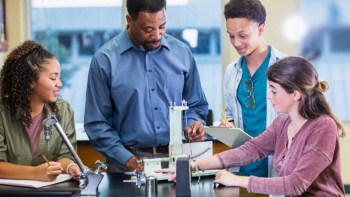Becoming a physics teacher is not just an option for new graduates. Tom De Trafford explains how he traded in his career in finance for teaching

There is something incredible about working with young people and giving them the skills and confidence to do something that they have never done before. For physics teachers, the ultimate challenge is to help those students who believe that physics deals with some mysterious, incomprehensible world to realize that it actually governs the world in which they live. If you can get just a few of these students to understand the relevance of physics to their lives, then you have achieved something important. It was this challenge that led me to switch careers midstream and retrain as a physics teacher.
When I finished my degree at Oxford University in 1991, I knew that I wanted to be based in London and earn enough to afford an extravagant lifestyle. These criteria led me away from science and technology into the world of finance, analysing the alcoholic drinks market at the investment bank BZW. As a young person, this was a wonderful place to be, with opportunities to travel and meet interesting people. But ultimately I realized that it was not the life I wanted. This dawned on me while I was eating a fantastic steak with a good wine at the Savoy but trying to justify a market forecast for the drinks firm Guinness that I knew would ultimately turn out to be incorrect due to factors I would never be told.
It was at this point that I moved to South Africa, where there was a demand for investment analysts with experience of European markets to help raise funds in the post-apartheid era. Although I loved working in Africa, it became clear to me after a few years that I wanted to move out of finance. On my return to the UK, I therefore got a job for a company that specialized in video-on- demand technology, albeit in a commercial position. As I sat through meetings, I discovered that I was much more interested in the technical part of the discussions and that what I enjoyed most was describing how technology works.
Taking the plunge
By the time I realized that the video-on-demand company was not going to offer me a long-term career, I had two small children and the priorities that I had used to launch my career were irrelevant to my lifestyle. It was then that I considered a more radical career change: retraining as a teacher. It took some time for me and my family to agree that this was the right decision, but the more family-friendly hours and the opportunity to work outside large cities were major plus points.
Next I had to decide how to train and what type of school to teach in. Having left London for a village in Cambridgeshire, I decided to apply for the Postgraduate Certificate of Education (PGCE) at Cambridge University. I was keen to obtain a recognized qualification and receive a good training that would give me confidence in my new career. The main alternative to the PGCE would have been an on-the-job training route called the Graduate Teacher Programme, where it is possible to earn a salary while training (see “Those who can, teach physics”).
The year of training was a humbling lesson in starting at the bottom, as I realized that teaching was a totally different skill to anything I had done before. The bulk of the course was spent working in two different schools. In the first I spent a lot of time observing classes and teaching parts of lessons. At the second school it became more serious and I was given a relatively full timetable to teach, although there was always support near at hand. A real treat was the weeks spent at Cambridge University with a combination of lectures and classes. Sitting back and letting someone else do the teaching was always enjoyable, and the quality of the discussions was excellent.
The teaching life
Since I completed my PGCE in 2004, I have been teaching physics at Comberton Village College, a rural comprehensive school that draws students from the villages around Cambridge. We attract pupils with a wide range of backgrounds, including the children of leading Cambridge professors. The school takes great pride in ensuring that all students are given the best chance possible.
Each class I teach is different, with its own problems and rewards. It is often the students who are hardest to teach that I get to know best and develop the closest relationships with. Ironically, this is a result of all the time I spend outside of normal lesson times discussing my expectations for their behaviour. There are also students who never fail to inspire me with their new and interesting ideas about science, which, although not always fully thought through, can reveal an approach that I had never considered.
Switching to teaching has been one of the most rewarding and worthwhile decisions I have ever made, but it has certainly not been an easy option. On days when I am teaching large and demanding classes with no free periods I feel that I am working harder than in any of my previous jobs. Compared with even the most difficult audiences I faced in the City, a large group of 15-year-old students is far less forgiving. However, I can also say that I never find myself sitting around wishing for the end of the day. As a teacher, you must plan your lessons carefully to ensure you get things right most of the time, but when you do the rewards are enormous.


